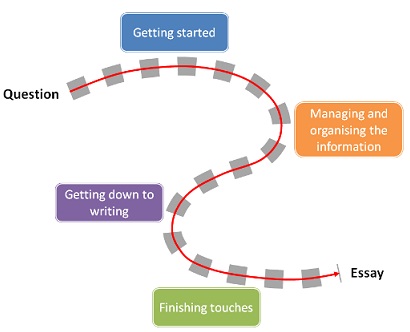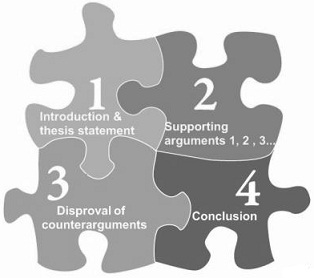The essay is a part of writing that discusses, explains or studies one topic. A Writer can write about any subject directly or indirectly, critically or humorously. Or we can say essay is short piece of writing about the precise subject by the writer as part of course of learning. It can describe personal convictions, or only reporting information that can help society. The essay can be written from personal point of view, although essays are most usually written in first person, or third person (topics which can be changed with the he, her, it, or them pronouns).

Essay is the usually allocated form of writing that every student will come across while in academia. Therefore, it is wise for student to become able and comfortable with this type of writing early on in her training.
Let’s start exploring into a variety of essay.
Types of Essays:
There are several types of essays. Following are some of most universal ones as described below:
Argumentative Essays:

This type of essay, not only provide information but also offer the argument with PROS (supporting ideas) and CONS (opposing ideas) of the argumentative issue. We must obviously take our stand and write as if we are trying to influence the contrasting audience to accept novel viewpoint or behavior. Main objective is to influence people to alter beliefs that many of them don’t want to modify. Aim of argumentative essay is to illustrate that statement about phenomena is right or more honest than others. Skill of argumentation is not easy talent to achieve. Most of people may think that when one simply has view, one can argue it efficiently, and these persons are all the time surprised when others don’t agree with them as their logic seems so correct.
The argumentative essay is apprehended together by following:
a) The clear, brief, and defined notion statement that takes place in first paragraph of essay.
b) Clear and rational conversions among introduction, body, and conclusion.
c) Body paragraphs that engage evidential support (logical, factual, statistical, or subjective).
d) A conclusion that doesn’t just repeat the hypothesis, but readdresses it in light of confirmation given.
Expository Essays:
Expository essay is a kind of essay that requires the student to study the idea, calculate evidence, describe the idea, and set onward the argument regarding which idea in clear and short manner. This can be proficient by means of comparison and contrast, description, illustration, analysis of cause and effect, and so forth.
The expository essay is held altogether by various things which are given below:
a) Clear, short, and defined theory statement that takes place in first paragraph of essay.
b) Clear and rational transitions among introduction, body, and conclusion.
c) Body paragraphs that involve evidential support.
d) A bit of creativity!
f) Conclusion that doesn’t just repeat hypothesis, but readdresses it in light of evidence given:
Descriptive Essays:
Descriptive essay is a type of essay that asks student to describe a person, experience, place, object, emotion, situation, and so forth. This type persuades capability of students to create a written account of the precise experience. This permits for a great deal of artistic freedom.
Instructions for writing a Descriptive essay are:
a) Take time to brainstorm
b) Use clear and concise language
c) Choose vivid language
d) Use your senses
e) What were you thinking?
f) Leave reader with the evident impression
g) Be organized
Narrative Essay:
A narrative essay utilizes all story elements - beginning and ending, plot, characters, setting and climax - all coming mutually to finish the story.
When writing the narrative essay, one can consider it as narrating the story.
Instructions for writing narrative essay are:
a) When written as story, the essay should engage all sections of the story
b) When narrative essay wouldn’t be written as the story?
c) Essay should have the aim
d) The essay should be written from the apparent point of view
e) Use clear and short language all through essay
f) Use of first person pronoun ‘I’ is greeted
g) As always, be controlled.
Critical Essay:
The word "critical" has both positive and also negative meanings. One can write critical essay that has the same opinion completely with reading. The expression "critical" describes the writer’s attitude every time you read essay. This approach is easily explained as a "detached evaluation," meaning that you consider the consistency of reading, wholeness of its data, and so on, before you believe or reject it.
Think the following during writing:
a) The critical essay is informative; it highlights the literary work being studied instead of the opinions and feelings of the person
b) The difference among feelings and facts is simple--it doesn’t matter that you believe about a book or play or poem.
c) Criticism does not mean you have to assault the work or the author; this only signifies you are thinking critically about it, determining it and talking about your findings.
d) In many circumstances, you are training your audience fairly new about text.
e) Literary essay normally uses a severe and objective tone.
Here are the examples of accepted critical essay topics:
• The Politics of Obama
• The Educational System of US
• My Favorite Movie
• Shakespeare “The Merchant of Venice”
Process Essay:
The term “process” defines a fixed or prepared series of actions or events leading to the outcome. Process essay describes how something is completed. It generally explains actions that should be executed in the sequence. It can explain in detail how to carry out a particular task, or it can illustrate how the individual came to certain personal attentiveness.
Structure of Process Essay Writing is given below:
a) Process Essay – Introduction
b) Process Essay – Body
c) Process Essay – conclusion